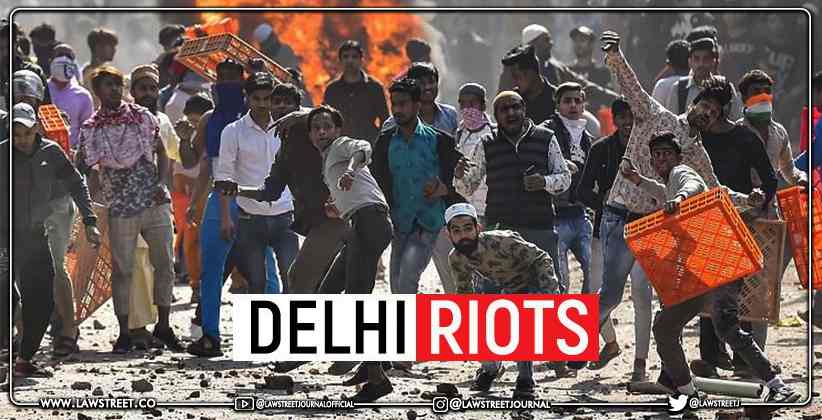Recently, the Delhi High Court observed that the riots which shook the national capital of the country in February 2020 "evidently did not take place in a spur of the moment, and the conduct of the protestors visibly portrays that it was a calculated attempt to dislocate the functioning of the Government as well as to disrupt the normal life of the people in the city."
It made the above observation while rejecting the bail application of Mohd Ibrahim, who was accused in the riots case relating to the murder of Head Constable Ratan Lal and causing injuries to police personnel during the North East Delhi Riots.
Facts of the Case:
On Feb 24, 2020, at about 01:00 PM, the protestors had gathered near the Chand Bagh area and 25 Futa Road and were moving towards the Main Wazirabad Road.
After assembling near Main Wazirabad Road, the police attempted to convince them not to move towards the Main Wazirabad Road. However, despite the warning issued by ACP Gokalpuri and DCP Shahdara via loudspeaker, some people amongst the crowd started pelting stones and beat them with weapons.
Due to this, severe injuries were caused to the police officers, and one of the Head Constable, Ratan Lal, even succumbed to death. Thereafter, the police arrested the accused in the above matter and others on several penal charges.
Court's contention:
The Court rejected the bail application of the accused after hearing the contention of both parties.
Presided by Justice Subramonium Prasad, the single judge bench of the Delhi High Court observed that systematic disconnection and destruction of the CCTV cameras confirmed the existence of "a preplanned and pre-meditated conspiracy to disturb law and order in the city." It noted that the rioters attacked a "hopelessly outnumbered cohort of police officials" rather ruthlessly with sticks, dandas, and bats, which goes on to show the pitiless manner of the turn of the events.
In his defense, Ibrahim had stated that he was brandishing a sword in personal defense and for the safety of his family. However, the Court dismissed his stand by stating that he was at least 1.6 km away from his place of residence and was in no imminent danger, and hence the onus of doubt rightly falls on him.
The Court further stated that although the Petitioner was not present at the scene of crime, he was undeniably part of the large mob. It added that "the Petitioner had consciously traveled 1.6 km away from his neighborhood with a sword which could only be used to incite violence and inflict damage."
On the question of the right to personal liberty and the right to protest, the Court further opined that "individual liberty cannot be misused in a manner that threatens the very fabric of civilized society by attempting to destabilize it and cause hurt to other persons."
Lastly, the Court stated that the footage of the Petitioner with the sword was "quite egregious" and is, therefore, satisfactory ground to keep the Petitioner in custody.
Rejecting the bail application, the single judge bench said, "In view of the facts and circumstances of the cases, without commenting on the merits of the matter, this Court is of the opinion that the Petitioner is not to be granted bail."
Case Title: Mohd Ibrahim vs. State (NCT of Delhi)












